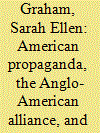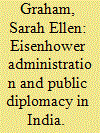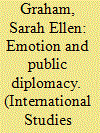|
|
|
Sort Order |
|
|
|
Items / Page
|
|
|
|
|
|
|
| Srl | Item |
| 1 |
ID:
089216


|
|
|
|
|
| Publication |
2009.
|
| Summary/Abstract |
While highly sensitive to embarrassment by us, the British exhibit a distressing lack of sympathy for the discomfiture to which we are exposed because of our association with them.1
Being for the most part abysmally ignorant, [Americans] are convinced that, as a result of the British Empire being kept together, the toilers of overseas are burdened with taxes for the benefit of the degenerate dukes in the metropolis.2
The close diplomatic relationship between Britain and the United States during the Second World War continues to inspire historical interest, much of it coalescing around the mixture of cooperation and discord that underscored the relationship. The received historical view is that the most significant disagreement between the Atlantic powers was the future of the colonial order in general and the status of the British Empire most especially. Washington and London's fundamental antagonism over the principles of postwar trusteeship and self-determination emerges virtually as a historiographical truism, evidenced by the florid and deeply divergent rhetorical positions taken by U.S. President Franklin D. Roosevelt and British Prime Minister Winston Churchill themselves.3 Turning to America's relationship with the objects of decolonization, however, it is evident that in many cases the U.S. commitment to freedom for oppressed peoples did not live up to the ideals espoused. From this angle, the Anglo-American disagreement over colonialism opens broader questions about the sources of U.S. foreign policy itself and the political constraints of its implementation. Did American strategic imperatives outweigh ideals that were genuinely held in the case of colonial self-determination? Was the rhetoric of decolonization purely instrumental? Or, as Michael H. Hunt has contended, was the "ideology" of U.S. foreign policy multifaceted, incorporating notions of racial hierarchy and an antipathy to revolutionary change as well as the much-valorized commitment to freedom, such that decision makers were at key moments highly amenable to the colonial status quo?
|
|
|
|
|
|
|
|
|
|
|
|
|
|
|
|
| 2 |
ID:
132413


|
|
|
|
|
| Publication |
2014.
|
| Summary/Abstract |
The United States-India relationship was fraught with misapprehension and ideological disagreement during the 1950s. Public diplomacy provides a valuable context for examining these dynamics. This analysis assesses the planning, deployment, and reception of American public diplomacy to India under President Dwight Eisenhower, a period encompassing Washington's 1954 alliance with Pakistan and economic aid to India in 1957-1958. Public diplomacy reflects the Administration's difficulty in clarifying its interests in India. The rhetorical and moralising approach of India's leadership, and their prominence in the global non-aligned movement, contributed greatly to this ambivalence. Public diplomacy planning highlights Washington's difficulties in confronting India's identity in world politics; it struggled to craft messages on racial attitudes, consumerism, and Communism, whilst Soviet public diplomacy gave strong competition throughout the period. At the same time, several aspects of American public diplomacy resonated with Indian audiences, indicating that there was the possibility of a closer American relationship with India had Washington taken a different high policy approach to the region.
|
|
|
|
|
|
|
|
|
|
|
|
|
|
|
|
| 3 |
ID:
136160


|
|
|
|
|
| Summary/Abstract |
States use public diplomacy (PD) to transmit information, ideas, and values that support their interests. Despite the centrality of emotion to early academic accounts of propaganda, emotion has not yet been addressed in contemporary PD studies, even in the context of the field's recent engagement with relational communication models. This oversight leaves the current scholarship on PD with an underspecified account of what PD actually does when it works—when it influences and persuades—because emotion is involved in these functions. At the same time, investigating these questions shows that PD practices deserve greater attention in debates within International Relations (IR) about language, power, and persuasion. Drawing on theories of emotion within constructivist IR and political theory, this article reviews two key functions of PD and asks how they engage public emotions. I show that emotions are present in argument, reasoning, and persuasion—particularly in the context of discourse about values. I then show how emotional expression reflects cultural difference, thereby influencing cross-cultural dialogue, and how emotion constitutes collective identities.
|
|
|
|
|
|
|
|
|
|
|
|
|
|
|
|
|
|
|
|
|